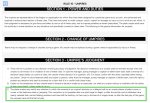Umpires can never overrule another umpires call. If you protest, the uic is called to the field and they then make a determination as to if the protest is valid or not and if the umpire used the correct rule and application. From there the uic makes a ruling.
Sent from my Pixel 2 using Tapatalk
Sent from my Pixel 2 using Tapatalk



